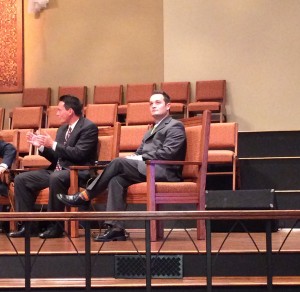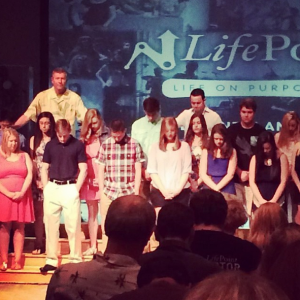by David Hanson | Jun 12, 2014 | The Youth Ministry Blog, Theology
In this weeks “Theology Thursday” we will be breaking down the doctrine of sanctification (the process through which we are made holy). More specifically, we will be looking at mortification and vivification.
While this sounds like high and lofty language that has no place in student ministry, you will be surprised how applicable the concepts are and, more than likely, you have been teaching these, just not by name.
Mortification
Les Galicinski in his paper, “John Calvin’s Doctrine of Sanctification” puts it this way:
“Mortification is the continual practice of putting to death the old self. Mortification is necessary because man’s nature is corrupt through the fall.”
In this definition, we hear strong ties to Colossians 3:5 that says, “Put to death therefore what is earthly in you: sexual immorality, impurity, passion, evil desire, and covetousness, which is idolatry.“
Mortification is the process by which we put to death what our depraved nature craves. We are a broken, sinful, selfish, self-centered, & self-serving people. Our actions continually indicate that we would prefer to be god and receive glory. Therefore, mortification is the process by which we battle this inclination.
Mortification is crucial concept for teenagers. Jesus is not just something they can add into their lives at no cost. There is a tangible cost to following Jesus, and those who don’t feel this tension, don’t understand mortification. While the Gospel is more than a list of do’s & don’ts, a heart that understand what Jesus has accomplished on our behalf feels the impetus to flee from sin, or that which separates us from Christ.
Vivification
Vivification, as defined by Calvin in his “Institutes for Christian Religion“, is:
“the desire to live in a holy and devoted manner, a desire arising from
rebirth; as it were said that a man dies to himself that he may begin to live to God”
Here again, we find ties to Colossians 3:2 which states, “Set your minds on things that are above, not on things that are on earth.” Vivification is the process through which we become the new self “which is being renewed in knowledge after the image of its creator” (Col. 3:10).
Vivification includes pursuing a righteousness that is not our own in that it is not meant for our glory, but for His. Students who grasp this concept understand that we are called to think, live, and act in a way that might not make since to those outside Christ. Faith is not something put in a drawer or on a shelf, but rather something that is lived out by loving God, loving others, and making disciples.
Youth Pastors: May we be found faithful in helping students grasp the two-step process of sanctification. May we faithfully navigate students in the process of putting sin to death and making Christ preeminent.
[guestpost]David Hanson: Texas native, Texas Tech Red Raider, M.Div. at Truett Seminary, husband to Ashley, father to Ava & Ben, Student Pastor at LifePoint Church in Plano, Tx, table tennis (ping-pong) extraordinaire, addicted to coffee. For anything else…you’ll just have to ask.[/guestpost]
by David Hanson | Jun 10, 2014 | The Youth Ministry Blog
One of the hardest parts about student ministry is saying goodbye to old students one week and saying hello to a bunch of new ones the next. Last Sunday was promotion week so all of our new 7th graders joined us for the first time.
As kids were streaming into our room I kept thinking “How am I going to learn all these new names?” It seems like every new name I learn pushes out an old name to make room. The older I get the harder it is for me to learn the new names of students, but it’s totally worth the effort. We can’t rely on excuses like, “I don’t have a good memory.” or “I’m not good with names.” We also can’t rely on nicknames like dude, buddy, and partner. Student’s will pick up on this shortcut really quick.
to make room. The older I get the harder it is for me to learn the new names of students, but it’s totally worth the effort. We can’t rely on excuses like, “I don’t have a good memory.” or “I’m not good with names.” We also can’t rely on nicknames like dude, buddy, and partner. Student’s will pick up on this shortcut really quick.
When we do the hard work of learning names, our ministry will feel more personal and personal ministries are ALWAYS more effective. Here are few tricks I’ve learned along the way to learn names and make them stick.
Rely on other leaders. Some ministries are larger than others and at some point it becomes impossible to know everyone’s name. While it’s good for the lead youth worker to know as many names as possible, it’s not necessary as long as SOMEONE knows their name. Instead of trying to learn everyone’s name, make it your responsibility to make sure every student is known by at least one leader. This relieves pressure on you and gives your leaders ministry ownership. One way we’ve done this is to take a picture of every student individually (or as a group) and do flash cards with leaders. Keep track of how many you get right and do it multiple times throughout the year to see if you are getting better.
Learn their last names and stories. It’s really tempting to learn just first names of students. We think of names as bits of information. If we shorten it to just a first name then we have to remember less. Actually, the opposite is true. You remember information that is relevant to you. Last names help provide context. They help you differentiate one Bobby from the next. Last names also help you connect new students with families. It’s a lot easier to remember Karson’s name if you remember that he is Blake’s younger brother (as I did last Sunday). If you know they come from a particular family you’ve now connected them to several other names that you already know and reinforced their importance, making their name easier to remember.
Make it a priority. Whenever I get on a bus for an event full of students I make my rounds to all the seats and introduce myself. It sometimes takes me a few laps to get most of the names, but it works. This shows my students that I’m serious about learning who they are. Another way to make it a priority is to make a public announcement that you’re trying to learn everyone’s name and you’ll buy lunch for anyone who’s name you don’t remember. This is called incentive. I don’t want to buy everyone lunch, so I learn names.
Names. Every student has one and they matter. Do the hard work and make sure that every student is known. It’s a simple thing that will keep your ministry feeling personal.
[guestpost]Kevin Libick is a Middle School Pastor living in Fort Worth, TX with his wife Kara and her two cats. He is a novice banjo picker and expert Hawaiian food eater. Kevin loves to connect with other youth workers and equip them to live out their calling in God’s Kingdom. Kevin loves to connect with and empower youth workers. Connect with Kevin on Twitter: @kevinlibick[/guestpost]
by David Hanson | Jun 9, 2014 | The Youth Ministry Blog
Summer is here! With a full summer calendar ahead of me, I was overjoyed to add two summer interns to our student ministry team. Here are five reasons you should hire summer interns in youth ministry:
1. Youth Interns bring a “cool” energy.
Your are middle-aged. They bring the “cool vibe.”
2. Youth Interns expand ministry.
We needed to focus on girls ministry = Awesome female intern.
3. Youth Interns bring fresh ideas.
Games, music, branding, videos, ask what they would suggest.
4. Youth Interns lighten the load.
Summer is busy, you CAN’T do it alone…enter intern.
5. Youth Interns are often future pastors.
My first ministry gig, and probably yours also, was as an intern. Develop, equip, and prepare them!
What would you add to this list? Comment below!
by David Hanson | Jun 4, 2014 | The Youth Ministry Blog
I just started a new book that already has me thinking. I’m reading Almost Christian by Kenda Creasy Dean. This book continues the conversations started by the National Study of Youth and Religion (NSYR) and Christian Smith in Soul Searching (also a great read).
Almost Christian has been on the “to-read” portion of my bookshelf, but it quickly moved up the list when I saw Mark Oestreicher’s high praise in a recent post:
“difficult and long read, but definitely one of the most important YM books in the last 5 years.”
Let me also admit…I’m only one chapter in, so I’m in no position to back this claim. BUT, the first chapter already has me questioning the content of my ministry. Under a section entitled “Does Church Still Matter?” Dean offers this nugget:
[callout]”…churches seem to have offered teenagers a kind of “diner theology”: a bargain religion, cheap but satisfying, whose gods require little in the way of fidelity or sacrifice. Never mind that centuries of Christians have read Jesus’ call to lay down one’s life for others as the signature feature of Christian love, or that God’s self-giving enables us to share the grace of Christ when ours is pitifully insufficient.”[/callout]
Ask yourself this question: Are you offering bargain religion? A bargain youth ministry? Does your calendar and the programs that fill it point students toward selfless abandon in favor of a worthy creator, or does is point students toward pointless fun and self-gratification?
Now don’t get me wrong…there is a HUGE place for fun in youth ministry. I’m not knocking fun, but rather a calendar of fun at the expense of anything challenging. Have we become the helicopter parents who are fearful to give any meaningful responsibility or experience for fear it won’t be fun or well attended?
Are we selling students a cheap gospel?
The longer I stare at my calendar the more I question how I am integrating the following concepts into teaching and programming:
- God Created
- Man Fell
- Christ Reconciled
- Our Response
- Consummation of History
What would happen if we ran EVERYTHING we planned, programmed, and taught through this filter? What would stick and what would be eliminated? We currently do this (to a degree) with our student ministry mission statement that reads as follows:
Fusion exists to see students KNOW (Phil. 3:10), LOVE (Ephesians 5:1-2), and WORSHIP (Psalm 96) God through a TRANSFORMING (Romans 12:2) relationship with Jesus Christ.
We do our best to ensure that what we plan, program, and teach moves students toward this desired goal. Are we bullet proof? Probably not. It’s amazing how many events youth pastors try to pass off as “community development.”
I can just see me answering to God one day:
God: Do your students KNOW, LOVE, and WORSHIP me?
Me: Nope, but they are a TIGHT community!
It’s getting late (10:19pm…I have kids), and I’m starting to get sarcastic, so I’ll end with this:
How do you decide what goes on the calendar? How do you prevent the student ministry from selling youth a cheap gospel? Comment below!
by David Hanson | Jun 2, 2014 | Uncategorized
Yesterday, our church celebrated the graduating seniors of 2014. As I called names and shook hands, I started thinking about all the ways we celebrate graduates. So today I want to share with you 4 ways to honor graduates.
1. Get involved with local baccalaureate services.
As youth pastors, we need to be continually looking for ways to integrate ourselves with the school system. One excellent way to do this during graduation time is through baccalaureate celebrations. Last year, our church had the good pleasure of hosting a baccalaureate service. And to be completely transparent, it wasn’t because of anything I initiated! The parent of one of our graduates was on the parent board and reached out me as they began to have discussions about locations. I quickly offered our space!
This year, another parent reached out to me and asked if I had interest in doing the opening Scripture & Invocation. Once again, I quickly said yes!
Did you notice the common denominator? PARENTS! What if you were to be productive and reach out to parents at the beginning of the year and offer your services for the end of the year baccalaureate service? The very next week I had a student, whom I’d never met, say she saw me at the service. A bridge was built.

Me getting my baccalaureate on…strike a pose!
2. Get grads in front of the church & then pray!
Every year we have a Senior recognition Sunday where we march the graduates across the stage, announce where they will be going, they shake the pastors hand, and then we pray. This is such a special time. Every year I hear people talk about how they taught the graduates in 3rd grade or held them in the nursery as babies. Bringing them before the congregation not only blesses the graduates, but it blesses the saints who have poured into them over the years. They get a chance, once more, to pray over the graduates as they prepare to take the next step.

Praying over graduates.
3. Give grads & parents food & a personal charge.
After our second service we do a lunch for our grads and their parents. We have done fancy food in the past, but found that everyone gets excited about BBQ (cheaper than fancy italian). As the parents and students dine, I take the opportunity to charge both parents and students. This talk usually involves some combination of: keep Jesus preeminent, who you surround yourself with matters, parents don’t “helicopter” your grads, but give them responsibility.
I then give them a gift. But not a Bible or a cheap “graduate prayers” book. They get so many gifts during this season and with a youth budget, let’s be realistic, it’ll be under $5, not that great, and in the end they’d probably prefer the $5! No, what we give them leads me to my next point!
4. Help grads find a new church.
We give our students the gift of community! Having read Sticky Faith, I wanted to be intentional in the way we help transition our grads. We want students to find a church the first week they step onto their new campus. We want them to be forward thinking about where they will attend and where they will find gospel community. We do this in two ways. A) We look up churches that we would want to attend if we were going to each respective college. B) We pass along the information of our students to the college pastors of these potential churches!
So what do you do? How do you honor grads and set them up for success? Post in the comments below!
[guestpost]David Hanson: Texas native, Texas Tech Red Raider, M.Div. at Truett Seminary, husband to Ashley, father to Ava & Ben, Student Pastor at LifePoint Church in Plano, Tx, table tennis (ping-pong) extraordinaire, addicted to coffee. For anything else…you’ll just have to ask![/guestpost]
by David Hanson | May 28, 2014 | The Youth Ministry Blog
(The following was TOTALLY stolen from my Associate Ben Fawcett @BFawcet)
The fact that Jesus was saving and redeeming people using music like this points to his sovereignty.
(There is a 90% chance I play this before our services on Sunday!)
by David Hanson | May 23, 2014 | The Youth Ministry Blog
Can you believe that Summer is almost upon us?! What are your plans this summer?
Here is our Summer Calendar for 2014:
(If you have a creative summer calendar that you would like me to share, just EMAIL ME and I’ll share it on the blog!)

Finally, what are you asking God for this summer? What do you want to see Him do or accomplish through you and the events you have planned? Share your response in the comments below!
Texas native, Texas Tech Red Raider, M.Div. at Truett Seminary, husband to Ashley, father to Ava & Ben, Student Pastor at
LifePoint Church in Plano, Tx, table tennis (ping-pong) extraordinaire, addicted to coffee. For anything else…you’ll just have to ask,
Email David.

by David Hanson | May 22, 2014 | The Youth Ministry Blog
Every weekday morning (okay – almost every), I head to the gym to do a little of that crazy thing called exercise. Today was no different. I woke up, ate breakfast, took my daughters to school and then headed to the gym. Parked in my usual spot. Walked into the gym and proceeded to scan my card. Here’s where it gets a bit interesting – the display on the card reader was reading “invalid card”.
Thinking the scanner misread my card I scanned it again and I got the same response from the card reader. A few thoughts started to pop into my head, “did I pay my membership?”, “have I been kicked out of the gym?”, and the ever popular “3rd time’s a charm – scan it again!” – so I did. Same response – “invalid card”! Then I noticed the reason…I was scanning a supermarket key tag instead of my gym key tag…oops!
This little lesson this morning reminded me that we can be doing all the right things and not getting the results we expect because we’re using the wrong tools. So often in ministry we fight hard to build a ministry or even a great program so students will want to come to our church and/or programs. Once they’re there we’ll talk to them about what God has done and how awesome Jesus is – hoping they come back.
That’s totally different to the way Jesus did ministry. Jesus went to the people and talked with them not to them. When He met with people, He helped them experience the love and grace of God. John 1:14 says, “The Word became flesh and moved into the neighborhood.” (The Message) NOT “The Word became flesh and waited for everyone to come see Him”. If we put our energies into “us going” instead of “them coming” we just might get the opportunity to show more students the love of Jesus.
- Maybe during the weekend take a cooler full of ice and water and some of your youth group to the park to give water to the kids playing basketball.
- Head to the high school with a few pizzas and invite students to join you for lunch
Doing little things like this show them that you are willing to “move into their neighborhoods” and live life with them. You never know what a simple act of love will do to someone – they just may meet that Jesus you keep talking about!
Nate has been in youth ministry for 10 years. He’s not famous. He hasn’t saved the world from impending doom, but he knows and loves a guy who did…and that guy is Jesus. Nate is the youth pastor at Flora United Methodist Church where he helps students AND parents through the journey of life together…with Jesus. He loves to teach/preach the Bible. Nate lives in Flora, Indiana with his wife Heather and their two awesome daughters, Riese and Sarah. Nate also blogs at: http://nateeckert.blogspot.com/

by David Hanson | May 7, 2014 | The Youth Ministry Blog
We’re taught to say “no” a lot in ministry. I’ve been told countless times that you need to say no more often so you don’t spread yourself too thin and become ineffective. As youth workers this a good principle because we are constantly confronted with good opportunities that would drain us from the things we need to be doing.
Taken to the extreme, this can lead to a mentality where we only focus on the things directly within our ministry and job description. We see church ministry like an assembly line where we focus only on our widgets. The problem with this is that the church is a family, not a factory. A family where the parts are connected. That means we need to say “yes” from time to time to ministry opportunities in other areas of the church.
Over the past couple of weeks I’ve said yes to serving other areas of our church that don’t directly effect my ministry to teens. One with a singles’ mission trip and another with a young families father/son retreat. Both are completely outside my job description. So when I was asked by leadership to take part, I could have declined. I said yes because I believe it makes ministry better.
Saying yes makes the Body healthy. The members of God’s body are interdependent. We should care about the health of the single’s ministry of your church, because it is just as important as yours. Both contribute to a healthy church body. I accepted the role of leading a single’s ministry mission trip because they needed someone and I was available. Saying yes means I am contributing to the health of the church at large, not just my own ministry.
Saying yes gives you opportunities for growth. When you step outside your normal ministry realm you get stretched in new ways. As part of the father/son retreat I had to speak to both dads and young sons. I have little experience teaching to either audience. It was challenging to come up with talks that could work for both an 8 year old and a 40 year old. Saying yes meant I learned to be a better communicator.
Saying yes shows your leadership you are ready. Many youth pastors, including myself, don’t want to get pigeon holed into one role. While ministry to teens is our main passion, we have other abilities to offer. Sometimes this helps leadership see you in a new light that might open doors in the future.
I’m not saying that you should say yes to everything. But maybe God is calling you to say yes to something that is outside your normal ministry. It may lead to an unexpected ministry experience, but you’ll never know unless you say yes.
Kevin Libick is a Middle School Pastor living in Fort Worth, TX with his wife Kara and her two cats. He is a novice banjo picker and expert Hawaiian food eater. Kevin loves to connect with other youth workers and equip them to live out their calling in God’s Kingdom. Connect with Kevin on Twitter: @kevinlibick
by David Hanson | May 6, 2014 | The Youth Ministry Blog
Last Sunday I had the awesome opportunity to preach to our adult congregation.
My topic: Spiritually Leading Teenagers
Watch it and let me know what you think!
Flip This Family – 2nd Edition: The Teen Years from LifePoint Plano on Vimeo.
If you like something you hear…steal it, use it, preach it!
Two sources I reference:
Sticky Faith – Powell, Griffin, Crawford
Soul Searching – Christian Smith
Texas native, Texas Tech Red Raider, M.Div. at Truett Seminary, husband to Ashley, father to Ava & Ben, Student Pastor at
LifePoint Church in Plano, Tx, table tennis (ping-pong) extraordinaire, addicted to coffee. For anything else…you’ll just have to ask,
Email David.








